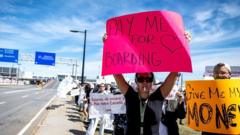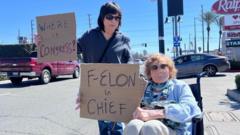The American Federation of State, County and Municipal Employees District Council 33, representing approximately 9,000 municipal employees, celebrated the news early Wednesday morning on social media, announcing, “The Strike is Over!” The union's members include around 1,000 sanitation workers, whose absence led to visible disruptions across the city. Mayor Cherelle Parker expressed her relief, sharing good news via a statement stating it would positively affect Philadelphia residents and businesses alike.
The strike commenced on July 1, resulting in the closure of public libraries and delays in municipal maintenance services, thus impacting the daily lives of Philadelphia's citizens. The most pressing issue was the accumulation of rubbish on city streets, further exacerbating public displeasure. To address the overflowing waste, Philadelphia government enlisted the help of private contractors and nonunion employees, although this strategy drew widespread criticism for its inefficiency.
Under the newly negotiated three-year contract, union members are expected to see wage increases totaling 14 percent during the term of Mayor Parker's administration. However, the agreement awaits ratification from the union members before it can be fully implemented. It is notable that the workers had only been operating under a one-year contract extension, which expired at the beginning of July, leading to their push for a more sustainable multiyear agreement. Historically, labor disputes of this magnitude have been infrequently seen, marking this strike as the first extended interruption by the union in nearly four decades.
As the city looks to recover from the labor disruptions, this new agreement stands as a pivotal moment in Philadelphia's labor relations.
The strike commenced on July 1, resulting in the closure of public libraries and delays in municipal maintenance services, thus impacting the daily lives of Philadelphia's citizens. The most pressing issue was the accumulation of rubbish on city streets, further exacerbating public displeasure. To address the overflowing waste, Philadelphia government enlisted the help of private contractors and nonunion employees, although this strategy drew widespread criticism for its inefficiency.
Under the newly negotiated three-year contract, union members are expected to see wage increases totaling 14 percent during the term of Mayor Parker's administration. However, the agreement awaits ratification from the union members before it can be fully implemented. It is notable that the workers had only been operating under a one-year contract extension, which expired at the beginning of July, leading to their push for a more sustainable multiyear agreement. Historically, labor disputes of this magnitude have been infrequently seen, marking this strike as the first extended interruption by the union in nearly four decades.
As the city looks to recover from the labor disruptions, this new agreement stands as a pivotal moment in Philadelphia's labor relations.





















